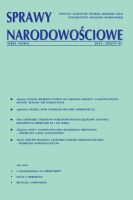Gruomota: the influence of politics and nationalism on the development of written Latgalian in the long nineteenth century (1772-1918)
Gruomota: the influence of politics and nationalism on the development of written Latgalian in the long nineteenth century (1772-1918)
Author(s): Catherine Gibson Subject(s): Cultural Essay, Political Essay, Societal Essay
Published by: Instytut Slawistyki Polskiej Akademii Nauk
Keywords: Latgale; politics of language; regional identity; nationalism; transnational history
Summary/Abstract: Latgale, the southeast region of Latvia, has a distinct ethnoregional identity largely due to the widespread use of the Latgalian language/dialect. The status of Latgalian as a language/dialect is highly politicised in Latvia today, yet this is not only a twenty-first century phenomenon. Since its inception as a written language in the mid-eighteenth century, the development of written Latgalian has been strongly influenced by politics and nationalism. This is an exploratory paper, which traces the impact of politics and nationalism on the development of written Latgalian throughout the long nineteenth century, a period in which the region was administered by three political regimes (Polish-Lithuanian Commonwealth, Russian Empire, First Republic of Latvia). Transnational perspectives are used to contextualise the development of written Latgalian with the development of other written languages in the vicinity (Belarusian, Latvian, Lithuanian, and Samogitian), and to open up the field for further comparative studies on the development of non-national written languages/dialect. Latgale is a borderland region often neglected in mainstream Latvian scholarship, and by extension, even more so outside Latvia. This paper hopes to go some way to rectifying this.
Journal: Sprawy Narodowościowe
- Issue Year: 2013
- Issue No: 43
- Page Range: 35-52
- Page Count: 17
- Language: English

